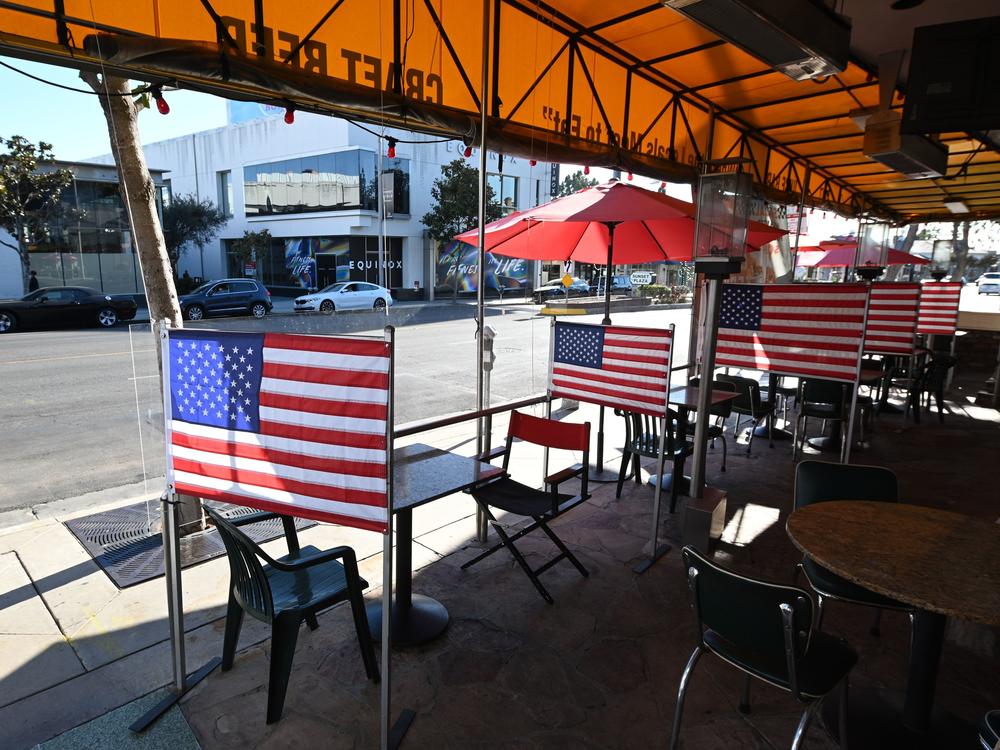Loading...
Section Branding
Header Content
'We're All Just In A Mess': Job Growth Expected To Slow Sharply Amid Pandemic Hit
Primary Content
Get ready for one of the most unpredictable monthly jobs reports in a while.
The pandemic has come roaring back, filling hospitals with coronavirus patients, while restaurants and retail shops empty out.
That is expected to put a squeeze on job gains: Forecasters expect a report Friday from the Labor Department will show that U.S. employers added fewer workers in November than the 638,000 created a month earlier.
How much less is uncertain as the pandemic makes it hard to forecast economic indicators.
Economists at Wells Fargo expect the United States added just 425,000 jobs in November, while other forecasts point to just under half a million.
What is more certain is the pain being felt by many restaurants and retailers. Only 54% of the 22 million jobs lost during March and April had come back through October, and relief aid passed by Congress earlier this year is set to expire the day after Christmas.
Cameron Mitchell, whose company operates dozens of restaurants in 13 states, said he worries about the future.
"We furloughed 700 of our 3,500 employees the week before Thanksgiving," he said. "We just can't sustain this for much longer."
Mitchell said traffic at his restaurants rebounded during the late summer and early fall, thanks in part to outdoor dining. But as temperatures fell and new infections soared, business has dropped off sharply.
Sales in the middle of this week were barely a third of what they were a year ago.
"A server [who] maybe worked five shifts normally is only able to get three now, or two. A cook who worked 40 hours is now only able to get 20 or 25," Mitchell said. "People are making only a fraction of what they used to make, and they have bills to pay, too."
Government restrictions on indoor dining have forced 10 of Mitchell's restaurants to close altogether. Even in cities with no such restrictions, customers are increasingly wary of going out and spending money.
"It's not just the restaurant business," Mitchell said. "Travel, hospitality, leisure, hotels. We're all just in a mess right here."
Job gains have declined each month since June, though some parts of the economy have performed better than others during the pandemic.
Homebuilders have been busy, thanks to strong demand for housing and historically low interest rates. Manufacturing has also held up relatively well, although factory managers report growing challenges with workers who've gotten sick or had to quarantine.
The job search website Glassdoor has also observed a late surge in holiday hiring, although it's weighted toward warehouses and delivery drivers, rather than brick-and-mortar retail stores.
"Even though there's a pandemic going on, the holidays aren't canceled," Glassdoor senior economist Daniel Zhao said. "Just like Americans might be video chatting with family this year instead of going in person, they're shifting their shopping for gifts online. So we do expect to see retail spending over the holidays to be fairly strong. It's just going to look different than it has in past years."
Government jobs have been declining in recent months. Friday's report is expected to show another drop in temporary census workers as the decennial headcount continues to wind down.
The unemployment rate in October was 6.9% — less than half what it was during the depths of the downturn in April. But the recovery is still far from complete.
President-elect Joe Biden has been urging Congress to clinch a new deal on coronavirus relief before the end of the year, with talks by lawmakers proceeding amid disagreements about how much in aid is needed.
Meanwhile, Federal Reserve Chairman Jerome Powell warned lawmakers Wednesday that many families and businesses will need additional help to get through the winter, even as new COVID-19 vaccines announced by drugmakers offer hope for a more complete economic recovery in the spring or summer.
"Sometime in the middle of next year, it really does look like that may be the light at the end of the tunnel," Powell said. "The problem is people who lose their homes now and businesses that go out of business; once they're gone, they can't just be re-created."
Copyright 2020 NPR. To see more, visit https://www.npr.org.

